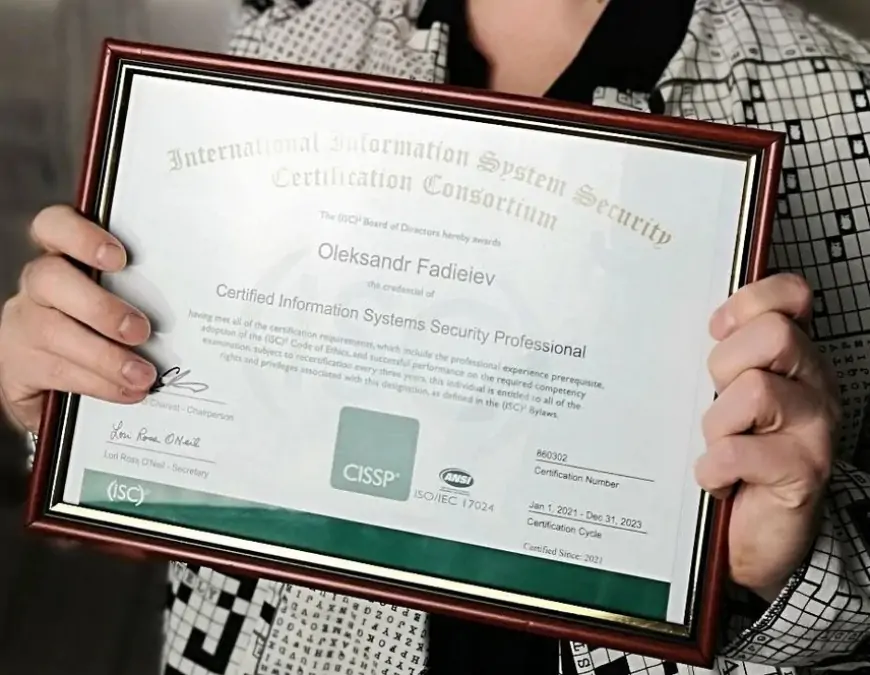What is CISSP certification? All you need to know
CISSP certification validates expertise in cybersecurity, covering areas like risk management, encryption, and network security.

For IT security experts aiming to enhance their careers or delve further into cybersecurity, obtaining the Certified Information Systems Security Professional (CISSP) certification is highly recommended. With cyber threats posing risks across various sectors, CISSP-certified individuals become indispensable assets to safeguard organizational data. This certification demonstrates your proficiency in safeguarding online information systems and leading robust IT security teams. Keep reading to discover everything you should understand about attaining CISSP certification.
Advantages of obtaining CISSP certification
Enhance your earning potential
CISSP-certified professionals typically command higher salaries, averaging around $128,000 annually in North America, as reported by Payscale. This certification is widely recognized globally, reflecting the rigorous process it entails.
Gain a competitive edge in the job market
Adding CISSP certification to your cybersecurity resume elevates your profile among recruiters and employers, positioning you as a top candidate in the industry. It also validates your extensive hands-on experience, typically spanning four to five years.
Deepen cybersecurity expertise
Pursuing CISSP certification involves mastering the comprehensive body of knowledge in cybersecurity, ensuring a thorough understanding of industry advancements. CISSPs are required to continually update their skills through ongoing education, fostering continuous professional growth and expertise.
- CISSP-certified professionals possess in-depth knowledge of crucial cybersecurity subjects, contributing to stronger security practices within their teams.
- The presence of certified professionals instills confidence within teams, as their expertise equips them to effectively address and mitigate security threats.
- Hiring individuals with cybersecurity certifications ensures that organizations benefit from current knowledge and best practices in the ever-evolving landscape of information security.
- Employing CISSP-certified professionals provides organizations with access to top-tier talent demonstrating proven expertise in cybersecurity, thereby bolstering their security posture.
Who should pursue CISSP certification?
For budding IT security professionals, the temptation to pursue CISSP certification shortly after finishing undergraduate studies or gaining entry-level cybersecurity experience may arise. However, eligibility for CISSP requires meeting specific criteria set by (ISC)². Candidates must have accrued either five years of full-time work experience or four years along with an undergraduate degree or equivalent credential. This certification process entails mastery of the Body of Knowledge (CBK), comprising essential domains like asset security and software development security. CISSP certification demands significant investment in terms of time, effort, and finances, yet it's highly sought-after by employers. Regardless of career aspirations, understanding your motivation can serve as a guiding force throughout the certification journey.
Obtaining CISSP certification
Pass the certification exam
The CISSP certification exam spans four hours and consists of 125 to 175 questions. Exam preparation resources such as practice exams and study materials are available on (ISC)²’s website. Registration for the exam is done online, with the exam administered in person at Pearson VUE testing centers. The exam fee is $749, and a passing score of at least 700/1,000 is required. Candidates who don't pass initially can retake the exam after 30 days, with up to four attempts allowed within a 12-month period.
Fulfill requirements
Candidates need to meet criteria regarding work experience, education, or professional credentials. This typically involves having five years of relevant work experience or four years combined with a related undergraduate degree or an (ISC)²-approved credential. Alternatively, individuals who don't meet these criteria can pursue becoming an Associate of (ISC)² after passing the exam.
Maintain certification
CISSP certification requires ongoing maintenance, involving earning a minimum of 120 continuing professional education (CPE) credits every three years. These credits can be acquired through various means such as attending courses or conferences, volunteering, or teaching, ensuring that CISSP holders stay abreast of the latest developments in cybersecurity.
Obtain endorsement
After passing the CISSP exam, candidates must secure an endorsement from a current certification holder, verifying their completion of requisite work experience. Candidates have nine months to obtain endorsement. In cases where endorsement is challenging to secure, (ISC)² may act as the endorser.












































